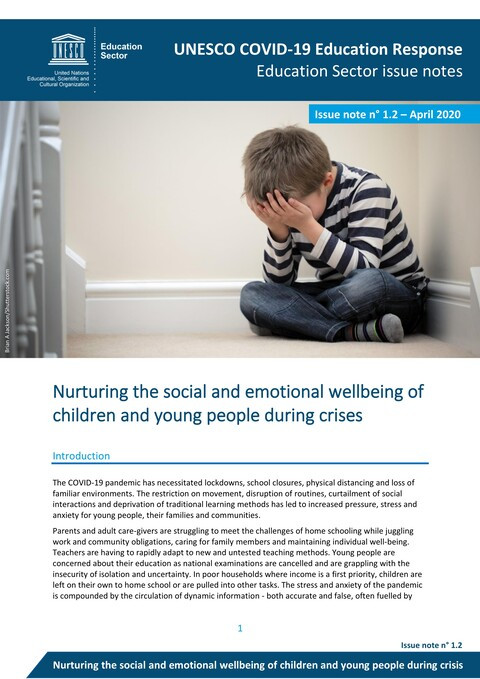
GCED Basic Search Form
Quick Search
Close
当前位置
相关资源
培育儿童和青少年在危机期间的社会情感健康 (联合国教科文组织针对新冠疫情的教育对策教育部门议题说明; No.1.2, 2020)
出版地 | 出版年份 | 页数:
巴黎 | 2020 | 6 p.
地区:
全球范围

新型冠状病毒大流行迫使人们采取隔离措施,保持社交距离并关闭学校,导致人们失去熟悉的环境,行动受限,日常生活被打乱,社交活动减少,传统的学习方式遭遇终结,因此带给年轻人及其家庭和社区成员前所未有的压力和焦虑感。
父母和成人照顾者不仅要兼顾工作和社区义务、照顾家庭成员并保持个人健康,同时,还要努力应对孩子在家上学所带来的挑战。教师需要快速适应未经测试的新教学方法。全国考试取消令年轻人对自身的教育前景备感担忧,社交距离和不确定性带给他们不安全感。对一些贫困家庭而言,维持收入是第一要务,因此他们不得不将孩子独自留在家中学习,或者吩咐他们去做其它工作。实时更新的疫情信息,加剧了人们的压力和焦虑感。这些消息真假参半,时不时蹦出一些耸人听闻的新闻报导,不仅增加人们的不安全感,也为狭隘心理、种族主义、排外情绪以及仇视性犯罪行为提供了生长的土壤。
为了应对新型冠状病毒引起的社交焦虑、情绪波动和令人恐惧的不安全感,家庭和社区迫切需要培养必要的应对技能和情绪复原能力。经实践证明,社会情感技能可以赋予儿童、青年、父母和教师必要的知识、技能、态度和行为,有助于其保持健康和积极的状态,有效管理情绪,采取正念的做法,展现亲社会行为并应对日常挑战。
资源类型:
会议和项目报告
主题:
人权
可持续发展 / 可持续性
其他
教育水平 :
幼儿保育
小学
初中
关键词:
Social and emotional learning
Mental health
Apprentissage social et émotionnel
Santé mentale
Aprendizaje socioemocional
Salud mental
